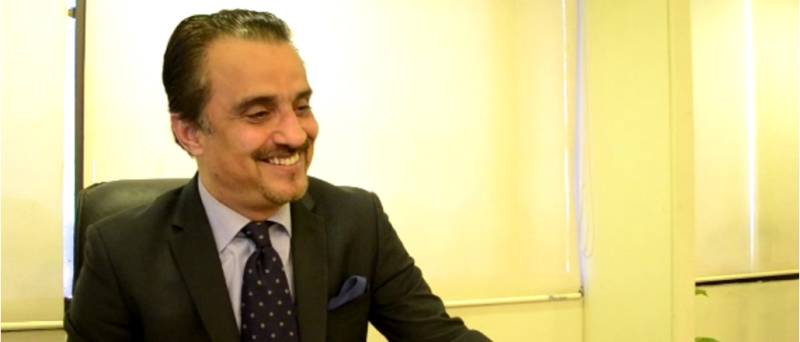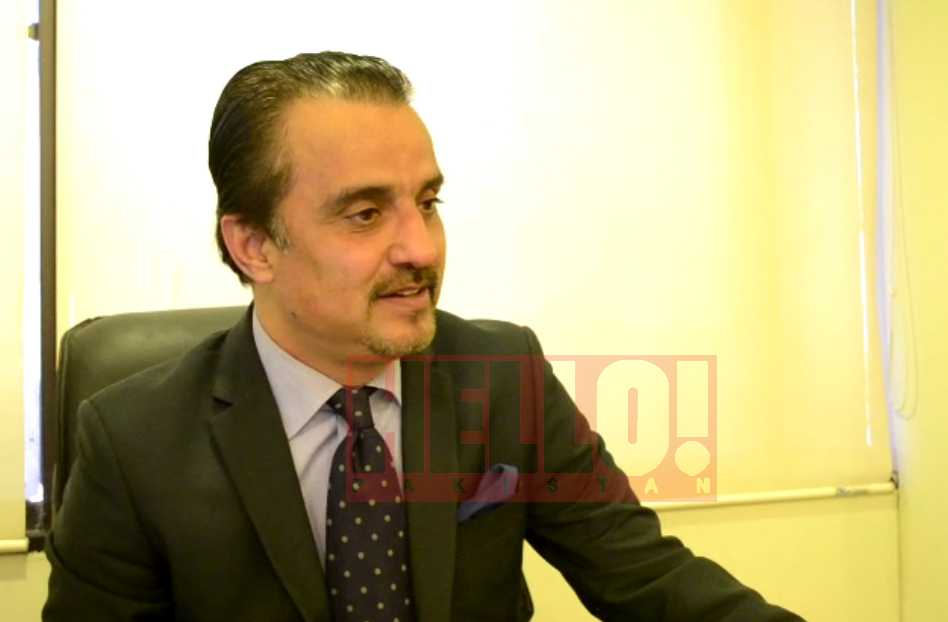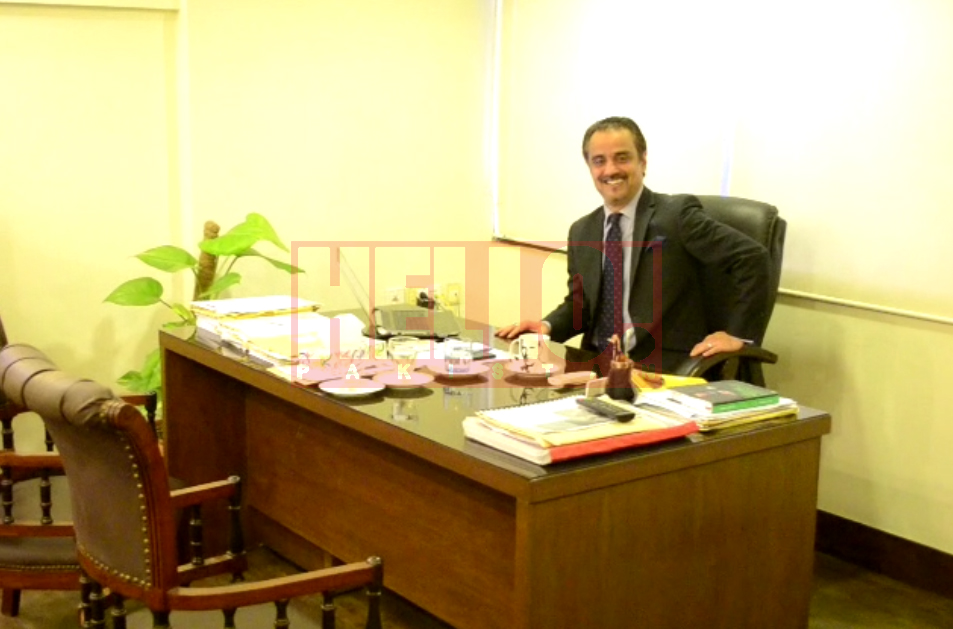Mir Mohammad AliKhan: The First Muslim Owner of An Investment Bank On Wall Street

The youngest Muslim banker to make his mark on Wall Street, Mir Mohammad AliKhan was only 29 years old when he became the Chairman and Founder of a Full service Investment Bank in America. Coming from a very well educated and affluent family, Mohammad led a privileged life for most of his years. He credits his parents for his accomplishments and for equipping him with courage, positivity and optimism that set him on a journey of immense success which includes developing “The World’s First Islamic Benchmark Index” among many other extraordinary achievements. Here’s a one on one with the man who dreams of changing the capital market in Pakistan
Q. Much of your success is attributed to your move to the United States - had you stayed back in Pakistan, what do you think your career path would have been?
A. Hindsight is 20/20. It's a very difficult question. I don't know but looking at the ground realities of Pakistan, I do not think I would have had such a meteoric rise - that's the reality but it is a very difficult question to answer. You don't know what Allah has planned for you.
Q. Introducing Islamic Banking in the United States was a very risky move - how confident were you at the time of your success?
A. It was a very risky move but I didn't think it was a risky move when I was doing it. I realised it later and by that time it had cost me my whole bank!
They shut it down, the whole controversy started but I felt it was my duty. We did not need the revenues from Islamic Banking because it was a field in its infancy. In fact, there was no way that I could have generated any revenue from it even if I wanted, so when I started to introduce Islamic Banking in America, it actually cost us money, over $2 million precisely to keep that fully staffed department running.

Q. Who was your mentor growing up?
A. You know I didn't have a mentor, but there was my uncle, Muqadar Ali Shariff. He was a successful business man and I used to look up to him. He was very good friends with my father and our distant relative as well. The way he carried himself, three piece suits, a cane in his hands, sometimes a cigar, he was dressed to kill, so that I liked. He was a business man so I looked up to him other than that there is a lack of mentorship in Pakistan. These days people get some mentoring through universities and social media but back when I was growing up in Pakistan, we didn't have any social media and finding a mentor would be really difficult and I did not know what I wanted to be. I did not know that I would be an investment banker; I wanted to go to the armed forces. I took the exam for Air Force Pilot but my mother said no, you're the only son, you cannot go!
Q. If you were to give today's generation a message, what would it be and why?
A. Positivity. You can have all the talent, all the knowledge, and all the skills but if you become a pessimist, you are not going to be able to use that towards your benefit. There are lots of opportunities in Pakistan. Me, as an investment banker, I came here at the peak of terrorism in 2009. I came because I realised that this region is going to succeed at a time in life when China would be coming in and all these other countries would be coming up. Pakistan has a lot of opportunities but the problem with the youth is that, you see, you cannot be a pessimist and expect to succeed. You have to have absolute positivity. You will find problems everywhere in the world, be it Pakistan, America or France. People succeed more there because there are a few more opportunities. Here, in Pakistan, we deny our own opportunities.
Q. Is today's America easier or harder to succeed in for a newcomer?
A. *laughs* I think the question itself has an answer in it. America and Wall Street are two different places. Mainstream America, yes there’s some chance I believe but the hatred after September 11th was not developed in overnight. Obviously there was suppressed hatred that came to the surface. Wall Street has always been a Zionist controlled entity so I was the first Muslim which was very difficult but now things have changed quite a bit for the worse. I hope Trump doesn't get elected, even if he does or he doesn’t ,the damage that he could've done to a major extent has already been done by him. So I think it’s a bit more difficult now compared to 25 years ago, absolutely.
Q. Do you believe in luck/fate or do you attribute all your success to your hard work?
A. I don't believe in the word luck, I do believe that Allah often rewards you for more than you have ever worked for. What you consider luck, is his mercy. You work 18 hours, somebody else works 18 hours in a day. You go to the same university and have the same degree but you succeed, you call that luck. Perhaps you did something that Allah liked or perhaps Allah knew that if I made this person successful, he would do more for the society than the other one. So hard work is a must, I don't attribute anything to handwork. Everyone has to work hard, everyone has to work smart but working hard doesn't entitle you to success at all, it’s a prerequisite. Just like we wake up every morning, we shower, we dress up, we eat three times a day and just because I eat three times a day does not mean that I shouldn't ever be sick. It’s what I eat that will determine how healthy I live. How smartly you work along with how hard you work is going to determine how far you will go in life.
Q. Reading your biography, clearly you have always been a family man as well - how do you balance your very successful professional and personal life?
A. I became a single father of two young boys very early in my life so I used to be quite the party man *laughs* Wall Street teaches you to party, to go out and by default you are wining and dining your clients all the time, you travel a lot. I have seen 62 countries in my life for business so when the responsibility came of raising my two young boys, I had to make a meteoric change. I’m not saying meteoric rise but a meteoric change, a 180 degree change; I started to become a family man. Responsibility taught me and commitment taught me so for the next 15 years until they became 18 and 19 my entire focus was my boys. Until this day during that journey, life made me realise the importance of relation over money. Wall Street had only taught me importance of money and success. Pain taught me, pain has always been my teacher. Pleasure is euphoric; you don’t learn anything from pleasure.
Q. What is your take on taking risks?
A. As an investment banker, landing at Wall Street at the age of 20, I was taught nothing but risk. I’m not a commercial banker; I’m an investment banker especially in a very risk taking society like Wall Street where you’re investing hundreds of millions of dollars or billions of dollars of your client’s money and you’re accountable for it, your career could end or your license could be taken away. So taking risks has to accompany knowledge. How knowledgeable you are, how well informed you are and how you identify opportunity and seize it and the first time you take the right risk, it gives you confidence. So it also has to do with confidence, it’s not just a stroke of genius. You could be a genius on Wall Street but if five or six of your deals fail in the beginning, your confidence will prevent you from taking further risks. So risks, I love to take risks, maybe a little less now. *Laughs*
Q. What’s your opinion on banking as a career choice in the very conservative banking environment world over today?
A. Banking has two sides, investment banking and commercial banking. Commercial banking is Barclays, Standard Chartered in Pakistan, investment banking is much different. I think the scope for investment banking is huge in the next coming decades. I think the scope for investment banking is much more now globally than what it used to be when I entered investment banking. When I entered investment banking, it was actually concentrated in the western countries. The concept had not caught on with the rest of the world, so now that it has, investments are coming up. In Pakistan you have CPEC and we are an emerging market now. Stock markets are doing really well. The course that I haven introduced is to teach people how to become investment bankers and how to make money in capital markets.
Q. You have fast paced through your career and success - did you ever feel this came at a cost? Has there been anything that you missed out on?
A very touchy subject. Yes I missed out on quite a lot. I missed out on peace of mind right from the beginning of my career. You start at the age of 20, by the time you’re 24, you’re an executive VP, by the time you’re 29 you’re running your own investment bank on Wall Street, your life is nothing but working hard. I remember when I first started my investment bank, I used to leave my house Monday morning with one suit on my body and four suits in my car, and I used to come back on Saturday. And I did that for 18 months. I used to stay in South Street Seaport at a motel right next to my building. I rented a room there. I used to sleep for two to three hours, take a shower, change and come back and on Saturday I would leave for home. I missed out on lots of friendships. Friends left me because I was always working. Money came but I had no time to enjoy it. It was just acquisition of materialistic things which I do not do now. I try to spend time with friends and try to keep my life simple. I’ve been through so much in the past 16 years and have lost a lot so I make sure I don’t anymore.
Q. Do you have any regrets today?
A. Never. Edhi Sahib was one of my mentors and I used to go see him. I used to sit down with him and talk to him. One day I asked him with his hand in my hand “Edhi Sahib do you have any regrets today?” to which he replied, “Regret is for something that has been done in the past, I don’t live in the past. Something that just happened five minutes ago is past for me so even if something happened five minutes ago I don’t think about it.” So that was my mentality and each time I meet somebody they say the same thing. I asked Nelson Mandala “How did you not have bitterness in you after being in jail for 28 years?” He said to me “When I walked out after being released from the building that I was in for decades, half way after I walked out and the gate was in front of me, it was that moment I stopped for a few seconds and looked back at the building and the gate that I was going to walk out from and realised, if I don’t leave my bitterness behind and walk out of the main gate, I will always be a prisoner.”
Q, How do you see the future of Pakistan specifically in terms of the economic environment?
A. Brilliant. But brilliance is not going to come without resilience. Nobody is going to throw a beautiful future in the lap of Pakistanis. We have to look at our strengths and the young generation has to look at their passion. CPEC is coming, which is going to be great for us and democracy is continuing. We have to equip ourselves. Even if we know that we can win the war, doesn’t mean we slack during our boot camp training. It is very important that we realise that we have a very bright future; this entire region has a bright future. It won’t just be put by someone on our lap we need to go and get it.
Q. Would you like your kids to follow your footsteps or pursue a similar career? Or would you advise them to follow and become what they aspire to be?
A. I would absolutely let them become what they want to be. My older son, Zayn wants to attend a culinary school, Le Cordon Bleu, and my younger son Zohayr wants to pursue his own career as well. I absolutely believe that children should be given enough room to nurture their creativity and their passion.

Q. How long have you been working on your books for? How many are there?
A. I’ve written two books, I’m working on my third one. I never really worked on my books as such. I’ve written around four to five hundred articles in magazines and newspapers around the world and 1000+ lectures in 25 years. I always wanted to get to writing books and educating when I reached towards my 50s. I went to Iran for ziarat and rented a cottage in the mountains, locked myself up without a phone or Wi-Fi. I used to sit at 8 o’clock in the morning to write and get done at 11:30pm - the process took a month.
Q. If you were to pick someone to play your role in the movie based on you, who would it be?
A. If Al Pacino was young I would love for him to play my younger years *laughs*. I don’t know, Shia LaBeouf maybe?
Q. What are you currently working on?
A. I have developed this course, I launched a company by the name of Mind And Markets two months ago and until then I was doing advisory work for capital markets. Everywhere in the world, students are involved and taught capital markets and how to make money. Pakistan is the only country where everything is taught theoretically and to get a job, right now I think there are close to 450 students graduating from Pakistani universities but nobody is teaching them how to benefit from financial markets. So, I have launched a company where we educate students, housewives, retired people or anyone through a course on how to benefit from the great financial markets of Pakistan.
Q. Conclusively, how would you describe your fashion style?
A. On Wall Street, you’re supposed to dress to kill and dressed to kill on Wall Street does not only mean Brioni suits or Armani shirts. It means having a sense of fashion and a sense of owning what you wear. I have worn a ridiculously priced suit with a very cheap shirt and a mediocre tie. It is about what makes you feel good. The fun side of Wall Street is the movie premieres, runways and fashion shows. My ex-wife was a very successful designer in America so from a very young age I have been exposed to a sense of fashion. I didn’t have any sense of fashion when I left Pakistan but exposure taught me how to pick and choose. I think the misconception that what is expensive is fashionable is the most ridiculous thing ever!
Did you enjoy this story? Leave your feedback in the comments below!
